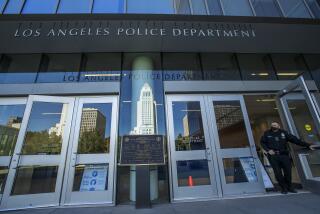Say No to Jury-Dodging
- Share via
Yes! The threat of enforced thumb twiddling has been lifted. Without much fanfare, the Los Angeles Superior Court has done something that almost everyone, including its own judges, thought impossible: replaced 10-day jury service with the requirement that citizens serve one day or one trial.
For the system to work, however, everyone has to shoulder his or her new, far less onerous responsibility. That’s why a state bill to let new categories of peace officers off the hook deserves defeat.
In Los Angeles, prospective jurors now are on call by phone for up to five days and are required to report to a courthouse only one day. If they’re assigned to a trial on that day, they serve until the end of the trial. If they’re not assigned on the day they report in, their service is over. Even the crowded downtown civil and criminal courts have made the switch. No more scrambling for a seat in stuffy jury assembly rooms, watching Korean soap operas or fumbling with jigsaw puzzles of playful kittens day after excruciating day.
With 480 judges, Los Angeles has the largest trial court in the free world. It needs 10,000 people on hand every day to provide enough qualified jurors. In 1988, the Legislature did away with rules that excused doctors, the self-employed and even judges from jury service. The court still can excuse someone if service would truly constitute a hardship to the juror or the public. State law exempts sheriff’s deputies and police and Highway Patrol officers under the theory that lawyers will routinely excuse them anyway--a claim not borne out by studies--and that their absence from their posts jeopardizes public safety.
The exemption owes much to the clout of peace officers unions, and those same unions are pushing to expand that exemption. AB 1970, introduced by Assembly member Barbara Matthews (D-Tracy), would categorically excuse parole and probation officers and prison guards. Her bill whisked through the Assembly last month and is scheduled to come before the Senate Public Safety Committee today.
But AB 1970 just compounds one bad idea with another. Parole officers are no more vital than, say, county foster-care workers or classroom teachers, who aren’t automatically excused from service. And prison guards, as a group, are no less appropriate as jurors in civil trials than county prosecutors, who aren’t excused.
In fact, there will always be reasons to exclude certain people from serving as jurors on certain cases. But to run smoothly, the new system needs a new throng of prospective jurors every day, which is why those exclusions should be made in the courtroom, not in the Legislature.
More to Read
Sign up for Essential California
The most important California stories and recommendations in your inbox every morning.
You may occasionally receive promotional content from the Los Angeles Times.













